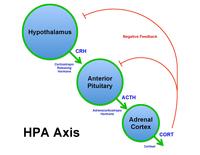
Dissociation between amygdala and bed nucleus of the stria terminalis during threat anticipation in female post‐traumatic stress disorder patients
Sign Up to like & getrecommendations! Published in 2017 at "Human Brain Mapping"
DOI: 10.1002/hbm.23513
Abstract: Feelings of uncontrollability and anxiety regarding possibly harmful events are key features of post‐traumatic stress disorder (PTSD) symptomatology. Due to a lack of studies, the neural correlates of anticipatory anxiety in PTSD are still poorly… read more here.
Keywords: post traumatic; symptomatology; anxiety; ptsd patients ... See more keywords

Structural correlates of emotional response to electrical stimulation of the amygdala in subjects with PTSD
Sign Up to like & getrecommendations! Published in 2020 at "Brain Stimulation"
DOI: 10.1016/j.brs.2019.12.004
Abstract: The basolateral amygdala (BLA) forms a triad with the medial prefrontal cortex (mPFC) and the hippocampus (HPC) to process incoming stimuli and orchestrate emotional responses [1]. In post-traumatic stress disorder (PTSD), a dysfunction in this… read more here.
Keywords: behavioral responses; stimulation; bla; ptsd patients ... See more keywords

Neurophysiological relationship of neuromuscular fatigue and stress disorder in PTSD patients.
Sign Up to like & getrecommendations! Published in 2020 at "Journal of bodywork and movement therapies"
DOI: 10.1016/j.jbmt.2020.06.041
Abstract: INTRODUCTION Apart from mental disorders, other complications that have been reported in some patients with Post-Traumatic Stress Disorder (PTSD), include physical pain and being quick to fatigue, which can severely affect the patients' daily life.… read more here.
Keywords: disorder ptsd; stress disorder; fatigue; ptsd patients ... See more keywords

Detecting implicit cues of aggressiveness in male faces in revictimized female PTSD patients and healthy controls
Sign Up to like & getrecommendations! Published in 2018 at "Psychiatry Research"
DOI: 10.1016/j.psychres.2018.05.061
Abstract: Victimized women are thought to have impairments in identifying risk and to have dysfunctional reactions to threatening situations, which increase the risk for revictimization. To investigate possible deficits in revictimized women, we used a method… read more here.
Keywords: male faces; revictimized women; healthy controls; aggressiveness male ... See more keywords

Effects of ∆9-tetrahydrocannabinol on aversive memories and anxiety: a review from human studies
Sign Up to like & getrecommendations! Published in 2020 at "BMC Psychiatry"
DOI: 10.1186/s12888-020-02813-8
Abstract: Posttraumatic stress disorder (PTSD) may stem from the formation of aberrant and enduring aversive memories. Some PTSD patients have recreationally used Cannabis, probably aiming at relieving their symptomatology. However, it is still largely unknown whether… read more here.
Keywords: anxiety; aversive memory; ptsd patients; review ... See more keywords

Levels of Peripheral Circulating IL-6 and IL-10 Decrease Over Time Despite High Depression Burden in PTSD Patients
Sign Up to like & getrecommendations! Published in 2022 at "Neuropsychiatric Disease and Treatment"
DOI: 10.2147/ndt.s357797
Abstract: Background Patients with combined depression symptoms and post-traumatic stress disorder (PTSD) often exhibit high levels of circulating inflammatory biomarkers as either a cause or consequence of their disease. We aimed to investigate how cytokines and… read more here.
Keywords: ptsd patients; depression; ptsd; year follow ... See more keywords

Angry and Fearful Face Conflict Effects in Post-traumatic Stress Disorder
Sign Up to like & getrecommendations! Published in 2019 at "Frontiers in Psychology"
DOI: 10.3389/fpsyg.2019.00136
Abstract: In the presence of threatening stimuli, post-traumatic stress disorder (PTSD) can manifest as hypervigilance for threat and disrupted attentional control. PTSD patients have shown exaggerated interference effects on tasks using trauma-related or threat stimuli. In… read more here.
Keywords: post traumatic; stress disorder; ptsd patients; face ... See more keywords